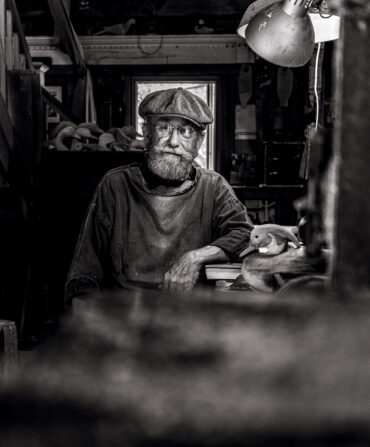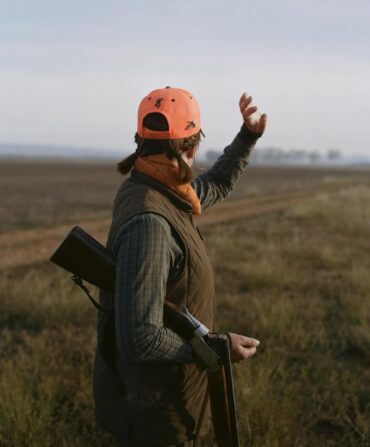Sporting
A Boat to See Me Home
The life story of one author could be stitched together by the boats that he’s owned—nearly seventy in as many years. But one sailboat in particular has led the fleet all along

Photo: Marc Burckhardt
A newspaperman I once knew told me that I should go ahead and have my gravestone cut and its epitaph inscribed so the heirs and assigns won’t get it wrong.
“Have them engrave, ‘If this is anything like his life, he won’t be here long,’” he recommended. “You go through jobs and cars and boats faster than croton oil through an old widow.”
Another time: “It’s a sure bet when you utter, ‘I think I’ll hang on to this boat’—like that pretty little Bristol Corinthian—well, it’s a damnable lie,” he said. “The veritable kiss of death for an exquisite daysailer.”
He knew me too well. I fell under the spell of boats at age six—how with wind or a motor they can take you anywhere the water’s wide and deep; how a frigate made of welded steel can overcome gravity and float like a feather on the sea. So I decided to build one for myself. I tarred and nailed together a couple of fruit crates and launched her on the creek running through my grandparents’ Alabama land. As soon as I stepped my right foot in and shifted my weight, the bottom boards cracked, and the clear cold water swirled around my leg. My heart broke. But when I stepped out, the broken crate floated up and moved off down the creek. Something about my boat actually sailing away, twisting with the current, bobbing on its own, was both thrilling and a balm.
In the sixty-three years since, I have seen some seventy vessels come and go—buying them, fixing them up, sailing them, selling them. A thirty-four-foot Harding lifeboat I salvaged from a decommissioned oil rig and converted to an apartment. The wooden gaffrig Fish-class sailboat I purposely sank so she’d survive a hurricane on Mobile Bay. The 1942 Chris-Craft my second wife and I lived aboard, renaming her from Red Witch II to Cana, in honor of the wedding feast. One after the other, all the boats I’ve loved stitch together my life story. But the Corinthian sails at the front of the fleet.
At nineteen feet, the Sailstar Corinthian was the baby of the Swedish-born designer Carl Alberg’s series of full-keel sailboats for Bristol Yachts, which built them from 1966 to 1980. And the darling of a set of sailors enamored of classic sailboats with long, deep keels, traditional lines, a sweet sheer, and wineglass transoms. Joe Claude, the old man who had taught me to sail on Mobile Bay, loved his Corinthian as a man loves his dog. He called her Easy Lady. He’d recline his lanky body on the teak cockpit seat on the windward side, drape his arm over the mahogany tiller, and fix his eyes on some low horizon beyond this world. He had a short-clipped white beard and cocked a Greek sailor’s cap over his brow, summer and winter alike. He spoke slowly. Chose his few words so they counted, and he didn’t waste his breath.
“I will teach you what I know aboard my boat,” he said. “I’ll repeat the same lessons aboard your boat.” And so we’d cast off in the Easy Lady on Mobile Bay as he showed me how to hoist sails, how to trim them for that just-so winged shape in the wind. “When in doubt, let it out,” he preached. “Get the sails set right, boy. Don’t pinch ’em. Don’t luff ’em.”
He corrected my language again and again, shuddering and frowning when I said the word rope. “Soon as you give a rope a job on a boat, the rope becomes a line. There’s not a piece of rope on this boat.” Things went from bad to worse for me when the line to adjust the jib or the mainsail became not a line, but a jib sheet or a mainsheet. And the lines that raised the sails became halyards. You don’t want to casually take on a sailor’s language. Joe Claude set me straight.
When he had taught me to steer my Cape Dory Typhoon—also a Carl Alberg design—we’d sail our two boats on the bay within a hundred feet of each other. Chasing, playing. Tacking close-hauled. Running wing on wing downwind. Within a month I’d stowed my outboard kicker and could sail into the harbor and right up to my slip. My Typhoon, which I named Copine, handled like a Jaguar roadster. Her name in French meant “girlfriend,” and she was a saucy little thing.

Brewer learned how to sail this Cape Dory Typhoon on Mobile Bay.
Our boats were small, but we would often sail across the bay just before sunset, all the way to the other shore and to Dog River and the Beachcomber club for fried crab claws and a pitcher of beer. Then sail home in the middle of the night, sometimes tying up in our slips at three in the morning.
Years later, I spotted a Corinthian on her side, beached in an automobile junkyard, and it all came blowing back, nostalgia covering me like a September morning’s mist. I was stunned. How’d she get here? Who would do this? I knew I had to rescue her from the dirt. She might just be the Easy Lady.
I could see Joe’s face almost as clearly as the wrecked boat in front of me. I looked over the Corinthian, brushing away dirt and dust. I kept an eye out for wasps that might’ve made her their home. At the stern, I studied the damage. The transom was crushed. Whatever name she’d borne was obliterated. Strange. She’d been wrecked almost like the rear-ended cars rusting away in rows around the salvage yard at Bob & Terry’s Automotive. I ran to the shop office and charged through the open door.
“Hey, Bob, what the hell’s a boat doing in your yard?”
“Some old man in town died and left it in the marina.” He looked up from his bookwork. “They hauled it out and blocked it up, waited for somebody to claim it. Nobody did. Then it was hit hard by the travel lift and knocked on its ass. They called and asked would I haul it off. Down to the landfill.”
Instead, Bob had brought it here. “Guess it’s just the junk man in me.”
“You don’t know what that boat means to me,” I said, temporarily forgetting the horse trader’s cardinal rule: Never reveal your burning desire. “You could hang me out to dry. How much will you take for it?”
Bob stopped looking at his ledger. He stood behind his counter with its plywood front gone oily dark, then leaned forward, his palms flat on the Formica countertop.
“Why do you give a damn about that old boat?”
I drew up close to the counter, took a seat on the one customer stool, a swiveling chrome-and-vinyl job that looked saved from some drugstore soda fountain, and told him about Joe Claude. “I popped off one time walking down the pier with Joe, said something about ‘one butt-ugly sailboat,’ and he snapped on me. Asked me how dare I say that about a boat, any boat. Joe told me that the boat was somebody’s Saturdays, somebody’s moonlight and sunshine. Somebody’s encounter with a dolphin, somebody’s delight watching a pelican’s belly drag over the waves.”
“What’d you say back to him?”
“Nothing. Didn’t get a chance. Without a word, Joe turned and walked off the pier. Didn’t see him for two weeks.”
Then I asked Bob again. “How much?”
Bob looked back down at the smudged page, with its penciled numbers in neat rows. He looked back at me. “Get it out of here without my help and it’s yours.” I started to mumble something. “Go on, get out before I change my mind. Figure out how you’re gonna pick up a two-thousand-pound boat.”
I grinned and quick-stepped out the door, calling out thanks over my shoulder, and wandered back down to look at the Easy Lady. I knew for sure and certain why Bob had brought the busted sailboat to his salvage yard.
He’d saved her for me. Magic.
Six months later, I launched the refurbished Corinthian at Pirate’s Cove down in Josephine, Alabama, just off Arnica Bay, where the Gulf of Mexico’s Intracoastal Waterway passes through. My journalist friend helped me. We got the mast up and the sails hanked on, and splashed the Easy Lady into the clear deep basin behind a sagging old bar and grill posing as a yacht club atop fat pilings leaning this way and that.
She was striking. Pretty and low in the water. Proud, with her bow sweeping up.
“I’m going to hang on to this one,” I said. “She’s just too sweet.”
I sold it before summer was over. Some desperate fellow ran out on the beach in front of the club, flapping his arms when I sailed close. I made ready to come about at the last minute, sort of showboating. I thought he was pissed that I’d come too near the swimmers. But he wasn’t. He wanted to buy my boat.
For all I put into it, I ended up losing a hundred bucks. But I’d let loose in the world another boat for sunset sails, for some years’ trading and retrading, a boat that almost got lost in the dirt between a couple of junk cars waiting to give up their parts in order for some other car to put more miles on the road. The way Joe Claude shared his knowledge and boat skills, his time and his soul of the sea with me, and kept me on the water for many more miles over the bottom.

Joe Claude.
I thought I was finished with Corinthians—that the junkyard beauty would be my last. But then one day recently, I found myself in that old familiar mood, a desire that comes on like weather. Sometimes a little freshening blow from the west that swings quick to the north and screams, or sometimes like a ghost out of the haze on a lazy summer afternoon. Maybe somewhere in America there might be a Bristol Corinthian for sale. Wouldn’t hurt to at least open up my laptop and look.
Five minutes into my search, I felt let down. That maybe the days of the sweet little daysailer were hove to in the fists of old pirates like Joe Claude and I’d never see another one tied up in my slip.
Then I saw a match. A 1967 Bristol Sailstar Corinthian for sale on Craigslist. Only about a thousand miles away from Fairhope in Baltimore. I looked at the grainy pictures of the rough Bristol, stuck sad and neglected on a trailer, her hull discolored and faded, the wood cockpit coamings split and rotting. I called up the owner. I did not ask for the fine details of her condition. I didn’t care. Whatever was wrong, I could fix. Within minutes, the former police captain thanked me for buying the Royal Flush.
I got off the phone. “That’s a stupid name for a sailboat,” I said aloud, to no one. What sailor, I wondered, drunk or sober would invite the term flush to be put in writing on a boat?Seaborne visions of some giant whirlpool sucking down a ship and crew to a watery doom scudded across my mind.
Then another image came over the horizon.
Old Joe stretched out in the cockpit of the Easy Lady, his finger to the bill of that Greek sailor’s cap, smiling at me just off his starboard beam, reaching along at hull speed those many years back. Now, whatever waters he might be sailing, wherever in the wide universe mysterious winds might be guiding him, he can rest easy. There will soon be another sailboat cruising this world in the memory of his Easy Lady. And I cannot help but wonder what boat will be tied up in my slip when I finally sail away to meet Joe once again.
Sonny Brewer is the author of The Poet of Tolstoy Park and other novels, as well as a forthcoming memoir about his life in boats.







